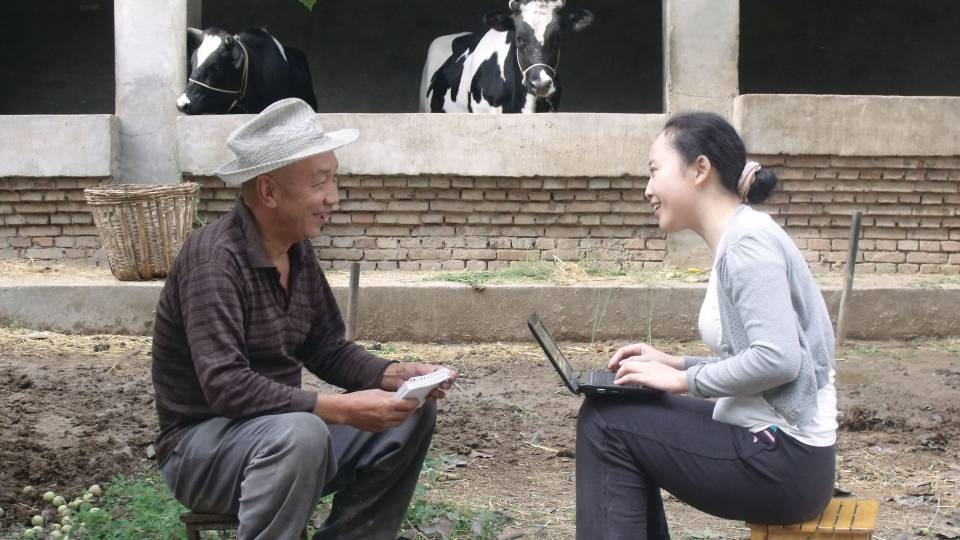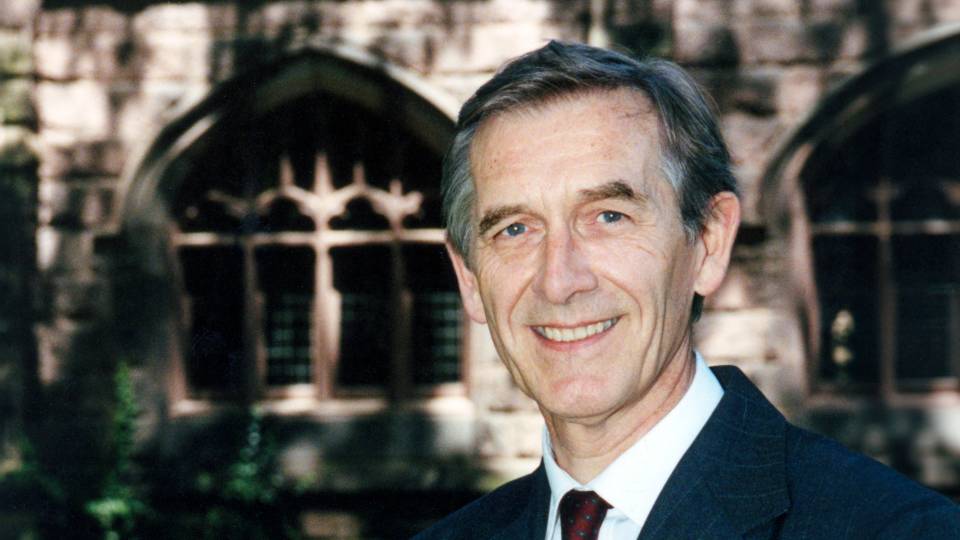Marion J. Levy Jr., the Musgrave Professor of Sociology and International Affairs, emeritus, died Sunday, May 26 of complications from Parkinson's Disease, from which he had suffered for several years. He was 83.
A larger-than-life figure on the Princeton campus, Levy was known for his scholarly contributions, his passionate involvement in academic issues and some unusual non-academic activities. He often was seen in the company of the Komondor dogs he loved and bred, and a self-published book, "Levy's Laws of the Disillusionment of the True Liberal," became a classic often quoted far beyond Princeton.
"Whether drawing a trail of onlookers when he was walking about with his dogs or standing to raise an objection at a faculty meeting, he left a memorable impression," said Princeton sociologist Gilbert Rozman, a colleague who also had been Levy's student. As a scholar, Rozman noted, Levy was a strong advocate for the three departments in which he served: the sociology department, the Woodrow Wilson School of Public and International Affairs and the East Asian studies department, in which he served as chairman.
Born in Galveston, Texas, a community to which he maintained lifelong ties, Levy had an outspoken personality, a quick and pointed wit, and an attitude that invited others to speak up as well. Although he came to Princeton in 1947 and never left, he considered himself a Texan, said his daughter, Dore J. Levy, a professor at Brown University.
Levy earned his bachelor's degree in economics from Harvard University and his master's degree in economics from the University of Texas. He switched to sociology after his adviser told him his structural analysis was "interesting, but not economics," his daughter recalled. "He preferred a field where nobody could tell him what it wasn't."
He received his master's and Ph.D. degrees in sociology from Harvard, working with renowned sociologist Talcott Parsons. Levy became a leading advocate of structural-functionalism and a critic of Parsons' methodology, including misplaced dichotomies.
Levy was a U.S. Navy officer during World War II, reaching the rank of lieutenant, senior grade, and serving as Japanese language officer. While serving in China, he did field work on the Chinese family, which informed his work as a comparative sociologist throughout his career. In his doctoral dissertation on the Chinese family and in later writings on China and Japan, Levy was fascinated with how historic patterns change. He produced a far-reaching analysis of China's traditional family structure and pioneering investigations of why Japan, instead of China, led the way to modernization in Asia. Later he would extend his interest in family patterns to generalize about the role of mothers in diverse societies.
In the 1950s, he became a central figure in efforts to make sociology scientific, emphasizing what all societies have in common. His emphasis on rigorous thinking is exemplified by his 1951 book, "The Structure of Societies."
During the 1960s, Levy was best known for his writing on modernization theory. His two-volume study "Modernization and the Structure of Societies" remains as the most systematic statement of that theory, classifying all societies into two types (relatively modernized and relatively non-modernized), and analyzing the differences between the two and how the transition occurs. He later contributed to volumes on modernization in various East Asian societies. His last book, "Our Mother-Tempers," was published in 1989; it was later republished as "Maternal Influence: The Search for Social Universals." In total, Levy wrote or contributed to 15 books and published more than 100 articles and reviews.
From 1976 through 1983, Levy served as director of the National Resource Center for East Asian Studies in the U.S. Department of Education. Among his honors, he received grants from the Ford Foundation and the National Science Foundation.
To some, Levy was best known for his collections of laws of human behavior, which in different editions grew from six to 11 short, telling sayings. "To know thyself is the ultimate form of aggression," Levy wrote as the seventh law. "No amount of genius can overcome a preoccupation with detail," is number 8. And number 11: "Nothing is so suspect as altruism."
Throughout his career at Princeton, and especially during the tumultuous 1960s and 1970s, he engaged in often-vehement discussions about the role of the University and higher education. "Marion Levy was very concerned about the integrity of educational processes, so that Princeton itself would be preserved in good order whatever the political sympathies might have been," recalled emeritus professor Stanley Kelley Jr., a close friend. "He was an unusual combination of someone who was both highly analytical and highly passionate. He was passionate about scholarship." Levy became an emeritus professor in 1989.
Levy is survived by his wife, Joy C. Levy; three children, daughter Dore J. Levy of Providence, R.I. and sons Noah R. Levy of Atlanta, Ga. and Amos M. Levy of New York City; one sister, Ruth Levy Kempner of Galveston, Texas; and five grandchildren.
Kelley, his friend, recalled that Levy once described a fantasy about how his death might be recognized by the University faculty, which traditionally rises as one body at faculty meetings to accept memorial resolutions honoring colleagues who have died. In the fantasy, Kelley was to line up conspirators among the faculty who would remain seated. Then, Kelley was to rise and say to the puzzled university president, "Aren't you going to call for the nays?"
"You can see how everyone just rising at once would violate his (Levy's) idea that things should be handled by discussion," Kelley said. "So this was a little fantasy which shows his sense of humor about himself, as well as his idealism and the conception he had about the sort of place a university ought to be."
Contact: Marilyn Marks (609) 258-3601

